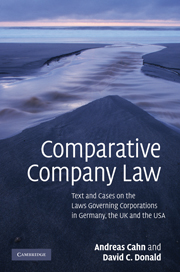 Comparative Company Law
Comparative Company Law Book contents
- Frontmatter
- Contents
- List of figures
- List of tables
- Preface and acknowledgments
- Glossary
- List of abbreviations
- Table of cases
- Table of legislation
- PART I The essential qualities of the corporation
- PART II The corporation and its capital
- PART III Governing the corporation
- PART IV Corporate combinations, groups and takeovers
- SUBPART A Mergers and acquisitions
- SUBPART B Companies in groups
- SUBPART C The market for corporate control
- 24 The regulation of takeover bids and prices
- 25 Management interference with takeovers bids
- 26 Special problems of leveraged buyouts
- References
- Index
25 - Management interference with takeovers bids
from SUBPART C - The market for corporate control
- Frontmatter
- Contents
- List of figures
- List of tables
- Preface and acknowledgments
- Glossary
- List of abbreviations
- Table of cases
- Table of legislation
- PART I The essential qualities of the corporation
- PART II The corporation and its capital
- PART III Governing the corporation
- PART IV Corporate combinations, groups and takeovers
- SUBPART A Mergers and acquisitions
- SUBPART B Companies in groups
- SUBPART C The market for corporate control
- 24 The regulation of takeover bids and prices
- 25 Management interference with takeovers bids
- 26 Special problems of leveraged buyouts
- References
- Index
Summary
Required reading
EU: Takeover Directive, arts. 9–12
D: WpÜG, §§ 33–33c
UK: CA 2006, secs. 966–971; City Code, Rules 20.2, 21, 24.4, 25, 31.9
US: DGCL, §§ 146, 203
Do shareholders need protection from offers to buy their shares?
The basis for evaluating hostile takeovers as a governance tool
Policy discussions evaluating takeovers build on numerous principles and theories taken from both law and economics, primary among which are the theory of collective action problems and an understanding of the efficiency of markets in pricing assets. A parallel consideration is the proper allocation of duties and powers between management and shareholders. The classic argument for takeovers as a necessary tool of corporate governance runs along the following lines:
1. Ordinary governance is not effective. A company's management may be unable or unwilling to cause a company to perform up to the level of its true potential. Shareholders, as we discussed in Chapter 16, may well be rationally apathetic when it comes to spending the money necessary to influence or replace management. The way that directors are nominated and elected and the fact that others will ride free on any efforts shareholders make to exercise their voting rights can dissuade shareholders from actively pursuing “political voice” in the general meeting as a way to change the management. Launching an all-out proxy contest against incumbent management can be both expensive and inefficient in terms of potential gain because it does not entail increasing the active shareholder's stake in and return from the company.
- Type
- Chapter
- Information
- Comparative Company LawText and Cases on the Laws Governing Corporations in Germany, the UK and the USA, pp. 795 - 843Publisher: Cambridge University PressPrint publication year: 2010


